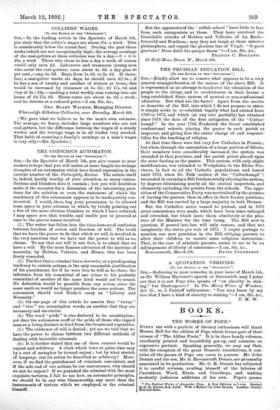THE CONSCIOUS AUTOMATON.
[TO THE EDITOR OF THE " SPECTATOR." I
SIR,—In the Spectator of March 5th, you give reason to your readers to hope that you will notice at some length the strange thoughts of an automaton which have found expression in the current number of the Fortnightly _Review. The article itself is, indeed, hardly worthy of your attention, so many contra- dictions and blunders does it contain ; but you will doubtless make it the occasion for a discussion of the interesting ques- tions for the solution or even the statement of which the machinery of this automaton appears to be inadequately con- structed. I would, then, beg your permission to be allowed some space in your columns in which, by briefly pointing out a few of the more obvious blunders to which I have referred, I may spare you that trouble, and enable you to proceed at once to the graver issues involved.
(1.) The writer has fallen into the time-honoured confusion between freedom of action and freedom of will. The truth that we have the power to do that which we will, is involved in the very assertion that we have not the power to will as we choose. To say that our will is not free, is to admit that we have a will. By the most famous advocates of the doctrine of necessity, by Hobbes, Voltaire, and Hume, this has been freely conceded.
(2.) The fact that a criminal has a character, or a predisposing tendency to certain actions, is the only reasonable justification of his punishment, for if he were free to will as he chose, the inference from his committal of one crime to his probable committal of another of the same kind would not be sound. No deduction would be possible from any action, since the same motives would no longer produce the same actions. The automaton should read Hume's essay on "Liberty and Necessity."
(3.) On one page of this article he asserts that " virtue " and " vice " are meaningless words, on another that they are necessary and inevitable.
(4.) The word "pride" is also declared to be meaningless ; yet does the automaton scoff at the pride of those who regard man as a being distinct in kind from the beasts and vegetables.
(5.) The existence of will is denied ; yet are we told that we have the power to choose between two different methods of dealing with incurable criminals.
(6.) It is farther stated that one of these courses would be unjust and arbitrary. A clock which loses or gains time may
by a sort of metaphor be termed unjust ; but by what stretch of language can its action be described as arbitrary? More- over, if we find the punishment of criminals convenient, and if the sole end of our actions be our convenience, why should we not be unjust ? If we punished the criminal with the most exquisite tortures, I fail to see how, on automatic principles,
we should be in any wise blameworthy, any more than the instruments of torture which we employed, or the criminal himself.
But the opponents of the' selfish school" have little to fear from such antagonists as these. They have survived the formidable attacks of Hobbes and Voltaire, of La Roche- foucauld and Bentham ; may they not laugh at these minuter philosophers, and repeat the glorious line of Virgil : "0 passi graviom ! Deus dabit his quoque finem "?—I am, Sir, &c.,
FRANCIS C. HOLLAND.
22 Half-Moon Street, W., March 6th.


































 Previous page
Previous page